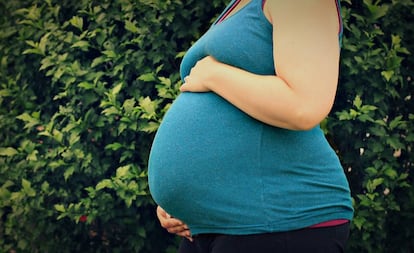Spain has the highest proportion of first-time mothers over 40 in the EU
A growing number of Spanish women are delaying having children, but experts warn waiting could hurt their chances of falling pregnant


Spain has become the country with the highest proportion of first-time mothers over 40 in the European Union. According to figures from the EU’s statistic agency Eurostat, based on 2017 data, 8.8% of women in the country were over 40 when they gave birth to their first child. In the previous 2015 study, Italian women had the greatest tendency to come to motherhood late.
Statistics show that 25-30% of childless women at 40 are not mothers because they cannot get pregnant Albert Esteve, director of the Demographic Studies Center
The phenomenon in Spain has been building over the past decade, with births from mothers aged 40 and over rising 63%, according to the National Statistics Institute (INE). Spanish youth are among the latest to leave home in the EU (average age is 29), while the average age for first-time mothers is 31. Figures show an average of 1.25 children per woman in 2018.
A number of experts point out that more than half the women who are not mothers would have liked to have had children but a prolonged wait due to the lack of secure employment, difficulty finding an affordable place to live and a lack of state subsidies, has worked against them.
Other women simply prefer to be older mothers, a cultural shift based on the desire for greater economic and professional stability.
Motherhood at 50
Italy and Spain also lead the EU when it comes to giving birth at 50 and over – which contrasts sharply with the 92% of Europeans who have their first child between 20 and 39.
“Methods, such as assisted reproduction, allow for childbearing age to be extended but there are no miracles,” says Albert Esteve, director of the Demographic Studies Center at Barcelona’s Autonomous University. “The fertility statistics in Spain show that 25-30% of childless women at 40 are not mothers because they cannot get pregnant.”
According to Esteve, there are economic reasons behind the statistics. “We are among the countries where independence happens later due to the lack of job security, low salaries and difficulty finding a place to live, factors which mean that people cannot leave home when they want to.”
Over 60% of first-time mothers are between 30 and 39, the highest figure in the EU
The European birth map highlights a clear divide between trends in the South, where there are less young mothers and more mature ones, and the East, – Bulgaria and Romania – where one out of every eight babies has a mother under 20. Hungary and Slovakia come in behind Bulgaria and Romania which have the highest percentage of young mothers, and very few first-time mothers over 40.
Together with a higher fertility rate and lower life expectancy, this means the East is getting younger while the South is getting older.
In Spain, it is becoming increasingly rare to have children before the age of 30 – 60.2% of first-time mothers are between 30 and 39, the highest figure in the EU. In Greece, Ireland, Italy and Luxembourg, women are also more likely to give birth for the first time in their 30s than their 20s.
“If couples leave it later and later to have children and women become mothers when they are more mature, many will end up not being able to have children and this is what is happening in Spain,” says Diego Ramiro, a demographic expert at the Spanish National Research Council. “More than 20% of women born in the 1970s will not have children. We have not yet caught up with Japan where the figure is almost 30%, but there could be long-term consequences. For example, when people get old, they won’t have a family network to look after them and other care systems will have to be put in place.”
English version by Heather Galloway.
Tu suscripción se está usando en otro dispositivo
¿Quieres añadir otro usuario a tu suscripción?
Si continúas leyendo en este dispositivo, no se podrá leer en el otro.
FlechaTu suscripción se está usando en otro dispositivo y solo puedes acceder a EL PAÍS desde un dispositivo a la vez.
Si quieres compartir tu cuenta, cambia tu suscripción a la modalidad Premium, así podrás añadir otro usuario. Cada uno accederá con su propia cuenta de email, lo que os permitirá personalizar vuestra experiencia en EL PAÍS.
¿Tienes una suscripción de empresa? Accede aquí para contratar más cuentas.
En el caso de no saber quién está usando tu cuenta, te recomendamos cambiar tu contraseña aquí.
Si decides continuar compartiendo tu cuenta, este mensaje se mostrará en tu dispositivo y en el de la otra persona que está usando tu cuenta de forma indefinida, afectando a tu experiencia de lectura. Puedes consultar aquí los términos y condiciones de la suscripción digital.








































